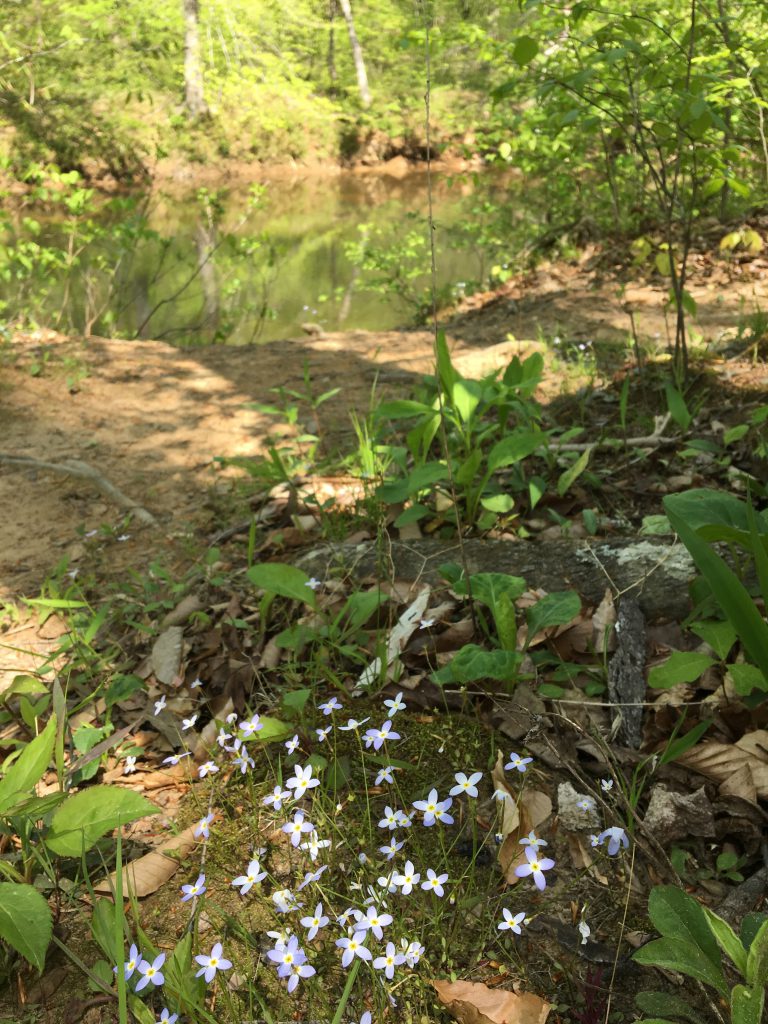
New Hope Creek was at its burbling best: the hardwoods nearly leafed out, the air warm but not summer warm, the wildflowers in abundance: spring beauties, bluets, chickweed, violets, periwinkle and a particularly stunning dwarf iris.
My hikers will love this! I thought, thinking ahead to the Sunday GetHiking! trip I was scouting. Then I heard a distinctive hum, with more volume than I was accustomed to. I looked down to see a carpet of bees swarming the trail, darting from this violet to that. I scampered 20 feet down the narrow path, skedaddling before my hairy legs became an annoyance.
Crap! I said to myself. Moments later, I encountered a second swarm, then a third and a fourth.
Before leading a hike, I like to scout the trail, especially one I haven’t hiked in a few months. Usually, I’m looking for downed trees, swollen creeks, anything that might pose a problem. That Thursday, I found a seasonal deterrent: bees.
It’s true, confirmed Rebecca Irwin, associate professor of zoology at N.C. State University, bees are especially active right now.
“They’re just up from hibernating and out collecting pollen and nectar,” Irwin said. “They’re waking up and need food.”
Familiar with the phenomenon of waking up hungry, I asked if they might be particularly aggressive.
“They don’t want to sting you,” assured Irwin, they want nectar, to feed their larva. The only danger is if you get in their way.”
I was glad that I’d elected to give the bees wide berth. An easy decision, considering I’m an EpiPen packer known to swell like the Michelin Man when we tussle. I am not alone.
According to the Centers for Disease Control and Prevention, about 2 million Americans are allergic to insect stings. Further, states the CDC, bees are the deadliest non-human critters in America, killing about 100 Americans annually. With that many bees on the trail and those odds, and with my own allergy to bees, I was glad I’d scouted the trail: we would hike elsewhere.
Note: This applies only to omnivorous bees. Wasps and hornets are omnivorous and are more motivated to sting for a meal. Avoid at all costs.
If you are allergic to bee stings, let your hike leader or hiking companions know. Carry an antihistamine or an EpiPen, as prescribed by your physician. Don’t hike alone.
If you or someone you’re hiking with gets stung on a hike, WebMd offers the following advice:
- Remove the stinger. Scrape the area with the edge of a credit card or straight edge object to remove it.
- Control swelling. Ice the area as soon as you are able.
- Treat symptoms. For pain, take an over-the-counter painkiller like acetaminophen or ibuprofen. If the person has a known allergy, treat with antihistamine or EpiPen.
- Follow-up. Keep an eye on the bite area for the next 2 to 5 days and keep it clean to prevent infection.
Call 911 if the person has:
- Trouble breathing
- Feelings of faintness or dizziness
- Hives
- A swollen tongue
- A history of severe allergy reaction to insect stings
* * *
More info